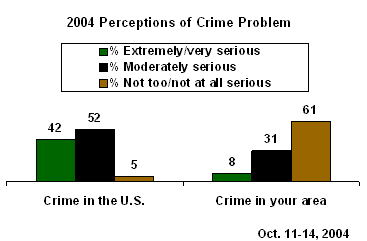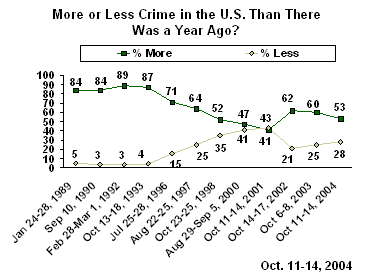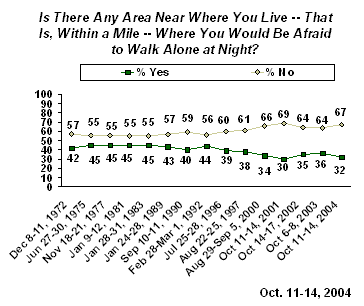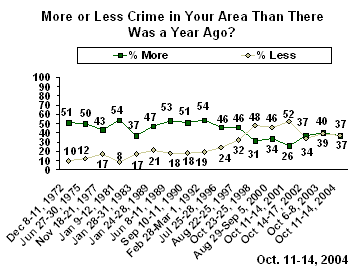GALLUP NEWS SERVICE
PRINCETON, NJ -- According to Gallup's annual update of crime attitudes, Americans grew less concerned about the nation's crime problem over the past year, erasing some of the increased concern evident in 2002 and 2003. The Oct. 11-14 survey finds fewer people saying that the crime problem nationally is worsening. On several measures it appears that Americans are also a bit less likely to fear for their personal safety.
Only 42% of Americans describe the nation's crime problem today as either extremely serious or very serious. This is down from 54% last year and from 60% in 2000 -- representing a substantial shift in such a short period. As is typical with many perceptions, Americans give much better ratings to their local area when rating crime. Only 8% say that crime in the area where they live is extremely or very serious. This compares with 11% last year and 12% in 2000.

Crime Rate Cut in Half Since 1989
Americans perpetually believe that crime in this country is on the increase, even though recent federal statistics show just the opposite. According to the U.S. Justice Department, the number of violent crime victims fell from 43 per 1,000 in population, aged 12 and over in 1989, to 22 per 1,000 in 2003. Similarly, the number of property crimes per 1,000 declined from 373 in 1989 to 163 in 2003.
Over the same 15-year period, the percentage believing there is "more crime in the U.S. than there was a year ago" has fallen from 84% to 53%. Today, 28% say that there is less crime while an additional 14% say the level of crime has remained the same.

While lower today than in the past, Americans' fear for their own personal safety has not dropped commensurate with the decline in perceptions about the national crime problem. One measure of this on the poll asks, "Is there any area near where you live -- that is, within a mile -- where you would be afraid to walk alone at night?" About one-third of the public (32%) says that there is such an area near their home. This is down slightly from 36% last year and 35% in 2002, but is not substantially lower than the 1989 level of 43%.

Additionally, Gallup asks about perceptions of the rate of local crime. Close to 4 in 10 Americans (37%) believe there is more crime in their area than there was a year ago, while an equal percentage say there is less crime. Unlike the recent improvement in perceptions of national crime, these figures are very similar to perceptions of local crime recorded in 2002.

For each of these questions, the all-time low of public concern about crime was recorded in October 2001 -- less than one month after the Sept. 11 terrorist attacks. In that poll, 41% perceived there was more crime in the country compared to a year ago, 26% said there was more crime in their area than a year ago, and 30% said there was an area within a mile of their home where they would be afraid to walk alone at night. The high points for concern on these measures vary, but two periods of high concern seem to be the early 1990s and the early 1980s. Clearly today's concern levels are much closer to the low end of the spectrum.
|
Summary of Perceptions of Crime |
|||
|
|
More crime in U.S. |
More crime in local area |
Area near home where afraid to walk
alone |
|
|
% |
% |
% |
|
High point |
89 (Feb 1992) |
54 (Feb 1992) |
48 (Jan 1982) |
|
Today |
53 (Oct 2004) |
37 (Oct 2004) |
32 (Oct 2004) |
|
Low point |
41 (Oct 2001) |
26 (Oct 2001) |
30 (Oct 2001) |
Property Crimes Tie With Terrorism as Top Crime Fears
Every year since 2000, Gallup has measured Americans' fear of being the victim of several different types of crime. The most prevalent common crime concerns are having a car stolen or broken into and having your home burglarized when you are away. Roughly 4 in 10 say they worry about each of these frequently or occasionally -- about the same as the reported degree of worry about being the victim of terrorism.
Several examples of violent crime, including being murdered or sexually assaulted, rank among the least common concerns.
|
Percent Worry Frequently/Occasionally -- 2004 |
|
|
|
% |
|
Having your car stolen or broken into |
41 |
|
Your home being burglarized when you are not there |
41 |
|
Being the victim of terrorism |
39 |
|
Having a school-aged child of yours physically harmed attending school |
30 |
|
Getting mugged |
27 |
|
Your home being burglarized when you are there |
24 |
|
Being attacked while driving your car |
23 |
|
Being sexually assaulted |
20 |
|
Being a victim of a hate crime |
16 |
|
Getting murdered |
16 |
|
Being assaulted/killed by a co-worker/employee where you work |
5 |
There has been a slight decline since 2003 in the percentage of people worried about the various property crimes. Concern about one's home being burglarized while away fell from 48% in 2003 to 41% today. Concern about being burglarized while at home fell from 30% to 24%. And the percentage highly worried about having a car stolen/broken into fell from 45% to 41%. The only change in concern about violent crime is for having a child physically harmed while attending school. This fell from 35% to 30%.
Survey Methods
These results are based on telephone interviews with a randomly selected national sample of 1,012 adults, aged 18 and older, conducted Oct. 11-14, 2004. For results based on this sample, one can say with 95% confidence that the maximum error attributable to sampling and other random effects is ±3 percentage points. In addition to sampling error, question wording and practical difficulties in conducting surveys can introduce error or bias into the findings of public opinion polls.
Q.15-16 ROTATED
15. Is there more crime in your area than there was a year ago, or less?
|
|
More |
Less |
SAME (vol.) |
No opinion |
|
|
% |
% |
% |
% |
|
2004 Oct 11-14 |
37 |
37 |
22 |
4 |
|
|
|
|
|
|
|
2003 Oct 6-8 |
40 |
39 |
19 |
2 |
|
2002 Oct 14-17 |
37 |
34 |
24 |
5 |
|
2001 Oct 11-14 |
26 |
52 |
18 |
4 |
|
2000 Aug 29-Sep 5 |
34 |
46 |
15 |
5 |
|
1998 Oct 23-25 |
31 |
48 |
16 |
5 |
|
1997 Aug 22-25 |
46 |
32 |
20 |
2 |
|
1996 Jul 25-28 |
46 |
24 |
25 |
5 |
|
1992 Feb 28-Mar 1 |
54 |
19 |
23 |
4 |
|
1990 Sep 10-11 |
51 |
18 |
24 |
8 |
|
1989 Jun 8-11 |
53 |
18 |
22 |
7 |
|
1989 Jan 24-28 |
47 |
21 |
27 |
5 |
|
1983 Jan 28-31 |
37 |
17 |
36 |
10 |
|
1981 Jan 9-12 |
54 |
8 |
29 |
9 |
|
1977 Nov 18-21 |
43 |
17 |
32 |
8 |
|
1975 Jun 27-30 |
50 |
12 |
29 |
9 |
|
1972 Dec 8-11 |
51 |
10 |
27 |
12 |
|
(vol.) Volunteered response |
||||
16. Is there more crime in the U.S. than there was a year ago, or less?
|
|
More |
Less |
SAME (vol.) |
No opinion |
|
|
% |
% |
% |
% |
|
2004 Oct 11-14 |
53 |
28 |
14 |
5 |
|
|
|
|
|
|
|
2003 Oct 6-8 |
60 |
25 |
11 |
4 |
|
2002 Oct 14-17 |
62 |
21 |
11 |
6 |
|
2001 Oct 11-14 |
41 |
43 |
10 |
6 |
|
2000 Aug 29-Sep 5 |
47 |
41 |
7 |
5 |
|
1998 Oct 23-25 |
52 |
35 |
8 |
5 |
|
1997 Aug 22-25 |
64 |
25 |
6 |
5 |
|
1996 Jul 25-28 |
71 |
15 |
8 |
6 |
|
1993 Oct 13-18 |
87 |
4 |
5 |
4 |
|
1992 Feb 28-Mar 1 |
89 |
3 |
4 |
4 |
|
1990 Sep 10 |
84 |
3 |
7 |
6 |
|
1989 Jan 24-28 |
84 |
5 |
5 |
6 |
|
(vol.) Volunteered response
|
||||
|
|
Yes |
No |
No opinion |
|
|
% |
% |
% |
|
2004 Oct 11-14 |
32 |
67 |
1 |
|
|
|
|
|
|
2003 Oct 6-8 |
36 |
64 |
* |
|
2002 Oct 14-17 |
35 |
64 |
1 |
|
2001 Oct 11-14 |
30 |
69 |
1 |
|
2000 Aug 29-Sep 5 |
34 |
66 |
* |
|
1997 Aug 22-25 |
38 |
61 |
1 |
|
1996 Jul 25-28 |
39 |
60 |
1 |
|
1994 Dec 19-26 |
39 |
60 |
-- |
|
1993 Oct 13-18 |
43 |
56 |
1 |
|
1992 Feb 28-Mar 1 |
44 |
56 |
-- |
|
1990 Sep 10-11 |
40 |
59 |
-- |
|
1989 Jan 24-28 |
43 |
57 |
-- |
|
1983 Jan 28-31 |
45 |
55 |
* |
|
1982 Jan 22-25 |
48 |
52 |
* |
|
1981 Jan 9-12 |
45 |
55 |
-- |
|
1979 Nov 2-5 |
42 |
58 |
-- |
|
1977 Nov 18-21 |
45 |
55 |
-- |
|
1975 Jun 27-30 |
45 |
55 |
-- |
|
1972 Dec 8-11 |
42 |
57 |
1 |
|
1968 Sep 19-24 |
35 |
62 |
3 |
|
1967 Aug 3-8 |
31 |
67 |
3 |
|
1965 Apr 2-7 |
34 |
66 |
-- |
|
* Less than 0.5% |
|||
18. Overall, how would you describe the problem of crime [ROTATED: in the United States/in the area where you live] -- is it extremely serious, very serious, moderately serious, not too serious, or not serious at all?
A. In the United States
|
|
|
|
|
Not too serious |
Not serious |
|
|
|
% |
% |
% |
% |
% |
% |
|
2004 Oct 11-14 |
13 |
29 |
52 |
5 |
* |
1 |
|
|
|
|
|
|
|
|
|
2003 Oct 6-8 |
17 |
37 |
40 |
4 |
1 |
1 |
|
2000 Aug 29-Sep 5 |
22 |
38 |
35 |
3 |
1 |
1 |
|
* Less than 0.5% |
||||||
B. In the area where you live
|
|
|
|
|
Not too serious |
Not serious |
|
|
|
% |
% |
% |
% |
% |
% |
|
2004 Oct 11-14 |
2 |
6 |
31 |
37 |
24 |
* |
|
|
|
|
|
|
|
|
|
2003 Oct 6-8 |
4 |
7 |
33 |
35 |
21 |
* |
|
2000 Aug 29-Sep 5 |
3 |
9 |
35 |
35 |
18 |
* |
|
* Less than 0.5% |
||||||
20. How often do you, yourself, worry about the following things -- frequently, occasionally, rarely or never? How about -- [ITEMS A-H ROTATED, THEN ITEM I]?
A. Getting murdered
|
|
|
|
|
|
DOESN'T APPLY (vol.) |
|
|
|
% |
% |
% |
% |
% |
% |
|
2004 Oct 11-14 |
6 |
10 |
29 |
55 |
* |
* |
|
|
|
|
|
|
|
|
|
2003 Oct 6-8 |
6 |
12 |
30 |
52 |
* |
-- |
|
2002 Oct 14-17 |
6 |
11 |
30 |
53 |
* |
* |
|
2001 Oct 11-14 |
4 |
9 |
31 |
56 |
* |
* |
|
2000 Aug 29-Sep 5 |
6 |
12 |
31 |
51 |
* |
* |
|
(vol). Volunteered response |
||||||
|
* Less than 0.5% |
||||||
B. Getting mugged
|
|
|
|
|
|
DOESN'T APPLY (vol.) |
|
|
|
% |
% |
% |
% |
% |
% |
|
2004 Oct 11-14 |
9 |
18 |
35 |
38 |
-- |
* |
|
|
|
|
|
|
|
|
|
2003 Oct 6-8 |
9 |
19 |
35 |
37 |
* |
-- |
|
2002 Oct 14-17 |
8 |
18 |
33 |
40 |
* |
1 |
|
2001 Oct 11-14 |
6 |
17 |
36 |
41 |
* |
* |
|
2000 Aug 29-Sep 5 |
9 |
21 |
33 |
36 |
1 |
* |
|
(vol.) Volunteered response |
||||||
|
* Less than 0.5% |
||||||
C. Your home being burglarized when you are not there
|
|
|
|
|
|
DOESN'T APPLY (vol.) |
|
|
|
% |
% |
% |
% |
% |
% |
|
2004 Oct 11-14 |
12 |
29 |
35 |
24 |
-- |
* |
|
|
|
|
|
|
|
|
|
2003 Oct 6-8 |
17 |
31 |
31 |
21 |
-- |
* |
|
2002 Oct 14-17 |
15 |
30 |
30 |
25 |
* |
* |
|
2001 Oct 11-14 |
12 |
28 |
33 |
26 |
* |
1 |
|
2000 Aug 29-Sep 5 |
16 |
32 |
28 |
24 |
0 |
* |
|
(vol.) Volunteered response |
||||||
|
* Less than 0.5% |
||||||
D. Your home being burglarized when you are there
|
|
|
|
|
|
DOESN'T APPLY (vol.) |
|
|
|
% |
% |
% |
% |
% |
% |
|
2004 Oct 11-14 |
8 |
16 |
34 |
42 |
-- |
* |
|
|
|
|
|
|
|
|
|
2003 Oct 6-8 |
10 |
20 |
30 |
40 |
* |
* |
|
2002 Oct 14-17 |
9 |
18 |
32 |
40 |
1 |
* |
|
2001 Oct 11-14 |
6 |
16 |
33 |
45 |
* |
* |
|
2000 Aug 29-Sep 5 |
10 |
21 |
30 |
39 |
* |
0 |
|
(vol.) Volunteered response |
||||||
|
* Less than 0.5% |
||||||
E. Being sexually assaulted
|
|
|
|
|
|
DOESN'T APPLY (vol.) |
|
|
|
% |
% |
% |
% |
% |
% |
|
2004 Oct 11-14 |
6 |
14 |
27 |
53 |
* |
* |
|
|
|
|
|
|
|
|
|
2003 Oct 6-8 |
9 |
14 |
27 |
50 |
* |
* |
|
2002 Oct 14-17 |
6 |
12 |
26 |
55 |
1 |
0 |
|
2001 Oct 11-14 |
4 |
15 |
24 |
57 |
* |
* |
|
2000 Aug 29-Sep 5 ^ |
7 |
16 |
24 |
52 |
1 |
* |
|
^ WORDING: Being raped or sexually assaulted |
||||||
|
(vol.) Volunteered response |
||||||
|
* Less than 0.5% |
||||||
F. Having your car stolen or broken into
|
|
|
|
|
|
DOESN'T APPLY (vol.) |
|
|
|
% |
% |
% |
% |
% |
% |
|
2004 Oct 11-14 |
12 |
29 |
31 |
25 |
3 |
-- |
|
|
|
|
|
|
|
|
|
2003 Oct 6-8 |
17 |
28 |
31 |
22 |
2 |
* |
|
2002 Oct 14-17 |
16 |
28 |
28 |
24 |
4 |
* |
|
2001 Oct 11-14 |
14 |
27 |
30 |
26 |
3 |
* |
|
2000 Aug 29-Sep 5 |
16 |
32 |
26 |
24 |
2 |
* |
|
(vol.) Volunteered response |
||||||
|
* Less than 0.5% |
||||||
G. Being assaulted or killed by a co-worker or other employee where you work
|
|
|
|
|
|
DOESN'T APPLY (vol.) |
|
|
|
% |
% |
% |
% |
% |
% |
|
2004 Oct 11-14 |
1 |
4 |
16 |
67 |
12 |
* |
|
|
|
|
|
|
|
|
|
2003 Oct 6-8 |
3 |
6 |
20 |
56 |
15 |
* |
|
2002 Oct 14-17 |
2 |
4 |
18 |
61 |
14 |
1 |
|
2001 Oct 11-14 |
2 |
5 |
18 |
62 |
13 |
* |
|
2000 Aug 29-Sep 5 |
1 |
6 |
18 |
62 |
12 |
1 |
|
(vol.) Volunteered response |
||||||
|
* Less than 0.5% |
||||||
H. Having a school-aged child of yours physically harmed while attending school
|
|
|
|
|
|
DOESN'T APPLY (vol.) |
|
|
|
% |
% |
% |
% |
% |
% |
|
2004 Oct 11-14 |
14 |
16 |
20 |
24 |
25 |
1 |
|
|
|
|
|
|
|
|
|
2003 Oct 6-8 |
17 |
18 |
16 |
23 |
25 |
1 |
|
2002 Oct 14-17 |
14 |
15 |
21 |
20 |
30 |
* |
|
2001 Oct 11-14 |
13 |
18 |
18 |
23 |
28 |
* |
|
2000 Aug 29-Sep 5 |
17 |
17 |
17 |
22 |
27 |
* |
|
(vol.) Volunteered response |
||||||
|
* Less than 0.5% |
||||||
I. Being attacked while driving your car
|
|
|
|
|
|
DOESN'T APPLY (vol.) |
|
|
|
% |
% |
% |
% |
% |
% |
|
2004 Oct 11-14 |
7 |
16 |
32 |
42 |
3 |
* |
|
|
|
|
|
|
|
|
|
2003 Oct 6-8 |
8 |
18 |
32 |
38 |
4 |
* |
|
2001 Oct 11-14 |
6 |
15 |
29 |
46 |
4 |
* |
|
2000 Aug 29-Sep 5 |
9 |
20 |
29 |
40 |
2 |
* |
|
(vol.) Volunteered response |
||||||
|
* Less than 0.5% |
||||||
J. Being the victim of a hate crime
|
|
|
|
|
|
DOESN'T APPLY (vol.) |
|
|
|
% |
% |
% |
% |
% |
% |
|
2004 Oct 11-14 |
6 |
10 |
24 |
59 |
* |
1 |
|
|
|
|
|
|
|
|
|
2003 Oct 6-8 |
5 |
12 |
29 |
54 |
* |
-- |
|
2001 Oct 11-14 |
5 |
8 |
26 |
60 |
* |
1 |
|
2000 Aug 29-Sep 5 |
6 |
10 |
26 |
56 |
1 |
1 |
|
(vol.) Volunteered response |
||||||
|
* Less than 0.5% |
||||||
K. Being a victim of terrorism
|
|
|
|
|
|
DOESN'T APPLY (vol.) |
|
|
|
% |
% |
% |
% |
% |
% |
|
2004 Oct 11-14 |
12 |
27 |
30 |
31 |
-- |
* |
|
|
|
|
|
|
|
|
|
2003 Oct 6-8 |
13 |
25 |
30 |
32 |
-- |
* |
|
2002 Oct 14-17 |
14 |
26 |
28 |
31 |
* |
1 |
|
2001 Oct 11-14 |
21 |
26 |
28 |
25 |
* |
* |
|
(vol.) Volunteered response |
||||||
|
* Less than 0.5% |
||||||
SUMMARY TABLE: FEAR OF CRIME
|
|
|
Oc-casion-ally |
Rarely or never |
DOESN'T APPLY (vol.) |
|
|
% |
% |
% |
% |
|
Having a school-aged child physically harmed attending school |
14 |
16 |
44 |
25 |
|
Having your car stolen or broken into |
12 |
29 |
56 |
3 |
|
Your home being burglarized when you are not there |
12 |
29 |
59 |
-- |
|
Being the victim of terrorism |
12 |
27 |
61 |
-- |
|
Getting mugged |
9 |
18 |
73 |
-- |
|
Your home being burglarized when you are there |
8 |
16 |
76 |
-- |
|
Being attacked while driving your car |
7 |
16 |
74 |
3 |
|
Being sexually assaulted |
6 |
14 |
80 |
* |
|
Being a victim of a hate crime |
6 |
10 |
83 |
* |
|
Getting murdered |
6 |
10 |
84 |
* |
|
Being assaulted/killed by a co-worker/employee where you work |
1 |
4 |
83 |
12 |
|
(vol.) Volunteered response |
||||
|
* Less than 0.5% |
||||
